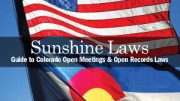By Jeffrey A. Roberts
CFOIC Executive Director
There was no clear winner of CFOIC’s “Sunshine Madness” competition, in which we asked you to tell us about your favorite (or least favorite) recent example of a blatant obstruction of the public’s right to know in Colorado.
But several of the 24 entries stood out as glaring illustrations of the barriers and attitudes journalists and members of the public sometimes encounter when they request government records or otherwise try to monitor what their public officials are doing.
Thank you to everyone who sent the Colorado Freedom of Information Coalition details about their own experiences or links to stories in the news. Although CFOIC ran the contest around Sunshine Week, an annual nationwide celebration of government transparency laws, we hear about similar issues nearly every day of the year from people who contact our freedom-of-information hotline (and you can read about some of them on our blog).

A few highly ranked Sunshine Madness entries concerned recent or ongoing controversies.
Two people nominated the four members of the Douglas County school board accused of skirting the Colorado Open Meetings Law by convening multiple one-on-one meetings in which they decided that district superintendent Corey Wise should be fired or asked to resign.
“Circumventing the statute by a series of private one-on-one meetings at which public business is discussed and/or decisions reached is a violation of the purpose of the statute, not just its spirit,” wrote Douglas County District Court Judge Jeffrey Holmes in ordering the four school board members to comply with the Sunshine Law. Still pending is a lawsuit that asks Holmes to nullify Wise’s dismissal because of the open meetings law violation.
Another nomination cited a CBS4 story about three prosecutors in the Denver City Attorney’s Office who used an internal messaging system to disparage their bosses and a coworker, confess to misusing a criminal records database and talk about how little they were working while at home during the pandemic.
Their conduct became known, prompting a disciplinary investigation, after one of the prosecutors inadvertently included a supervisor in the discussions. In an email among the three, obtained by investigative reporter Brian Maass, one of the prosecutors worried about their conversations becoming public.
“Is there any way that the City can get a copy of these chats?” she wrote. “If they keep these logs, wouldn’t they be subject to CORA (Colorado Open Records Act)? Can we set the chat to purge? Not worried about you two but suddenly feeling a little exposed.” Two of the lawyers resigned and the third was suspended but returned to her job.
The Aurora Police Department warranted a couple of nominations for its 12-week backlog in processing records requests. Although there is no response-time deadline in the Colorado Criminal Justice Records Act (CCJRA), except for a small subset of “official action” records, it’s obvious why such a long wait would frustrate journalists pursuing news stories.
Among other notable nominations:
- The Florence City Council, which publicly released seven executive session recordings after acknowledging it violated the open meetings law by failing to properly announce the closed-door meetings. The recordings, according to KRDO, “paint a picture of a government in distress while amid a city hall sexual harassment scandal.”
- The Arvada Police Department, which charged each of multiple news organizations $100 for a flashdrive containing documents, videos and photos related to the Olde Town shooting of a police officer. CCJRA allows law enforcement agencies to charge “reasonable fees, not to exceed actual costs” to research and retrieve public records, but it doesn’t require agencies to explain those charges in detail.
- Two members of the Rio Blanco County Commission for making a decision about the county attorney’s reappointment without including the third commissioner in the discussion. The Rio Blanco Herald Times also noted a dramatic increase in the number of commission executive sessions under a new county attorney, as well as executive sessions held for personnel matters without giving employees the choice to have their status discussed in a public meeting.
- Members of the Mesa County school board for communicating and reaching an agreement with a law firm outside of a public meeting and without informing other members of the board.
- The Colorado Department of Human Services for withholding aggregate child-abuse hotline statistics for three state-licensed residential facilities from 9NEWS and The Colorado Sun. The news organizations sued but a judge dismissed the case, writing that it might be possible for someone using the statistics — “put together with other information” — to identify a specific caller from a facility. The ruling has been appealed.
- Jefferson County Public Schools, for responding differently to two identically worded CORA requests. The district’s records custodian denied one request in May 2021 because the records contain “information that is subject to attorney-client privilege.” In November 2021, the records custodian denied a second request because “Jeffco Public Schools does not have an existing document that is responsive to (the) request.”
- The El Paso County commissioners for discussing a ballot question in executive sessions. An advocacy group sued, asserting the closed meetings hadn’t been announced properly, but a judge ruled that the meetings did not violate the Sunshine Law.
Follow the Colorado Freedom of Information Coalition on Twitter @CoFOIC. Like CFOIC’s Facebook page. Do you appreciate the information and resources provided by CFOIC? Please consider making a tax-deductible donation.




